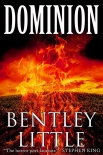DOMINION Bentley Little (accelerated reader books .TXT) 📖

- Author: Bentley Little
Book online «DOMINION Bentley Little (accelerated reader books .TXT) 📖». Author Bentley Little
“We have to study,” Penelope said.
“We could study afterward,” Dion suggested.
“We have to study,” she repeated firmly.
He nodded. “Right,” he agreed. “Right.” He handed the empty glass to Penelope’s mother. “Thanks,” he said.
There was silence for a moment. Dion was awkwardly aware that everyone was staring at him: Penelope, her mother, her aunt. He didn’t know what to say and was about to make some sort of generic remark when Penelope saved him and suggested that they go out to the Garden.
“Study in a garden?” Dion said.
She laughed. “I’ll show you. Come on.”
He said good-bye to the two women and followed Penelope out of the kitchen. Though nothing had happened, nothing he noticed, he got the feeling that he had passed some sort of test. He thought of Penelope’s mother and her aunt, and he was not sure if he liked that or not.
He followed Penelope through the library as she opened the sliding glass doors and stepped outside.
16
Frank Douglas had been a bartender for a long time, for thirty-three of his fifty-six years, and while he might not have had the academic credentials of a sociologist, he had learned a little about reading people in his time behind the counter. Individuals and crowds. He could be pouring drinks, wiping up, engaging in superficial chitchat with the more talkative regulars, but at the same time his senses were always open, his antennae out, working, measuring, gauging, sizing up.
And this crowd was weird.
He poured himself a mineral water and downed half of it in a single swallow. The night crowds had all been weird lately. Or at least weird for this bar. The Pioneer usually attracted a steady, stable clientele of after-work drinkers and evening socializers, a solid blue-collar beer crowd. But in the past few weeks the makeup of the bar had gradually shifted. No, not the makeup. The personality. For the people were still the same, and, individually, they seemed no different than they had before. They wore the same clothes, drove the same cars, came and left at the same times. But the configuration of the crowd when these people were together had changed completely, and that had changed the whole tenor of the bar. Gone were the endless public rehashes of the weekend’s sporting events, the petty domestic complaints, the boring shoptalk.
Conversations now were quiet, less public, more intimate, more personal, usually between two people. Usually between a man and a woman.
And these days most of his customers were drinking wine instead of beer.
A lot of wine.
Frank finished his mineral water, washed out the glass.
His gaze wandered to the back wall, where the once empty booths were all full, populated with people who sat very close together in the darkness.
That was the strangest thing of all. Many of these people had known one another for years, had been friends or acquaintances, bar buddies, but had always looked elsewhere for love. Now they suddenly seemed to have discovered each other, and they were behaving like high school students in heat.
It didn’t make any sense.
At Josh Aldridge’s high sign, he poured the roofer another wine cooler, placing it on a napkin before him.
What made even less sense was the feeling he got that beneath the surface calm there lurked a barely concealed storm. It was a strange feeling, an unfounded feeling, but as much as he tried to discount it rationally, it would not go away. Despite the intimate discussions, despite the quiet nuzzling, despite the lovey-doveyness, he had the impression that it would require only a very slight provocation to stir up this crowd, to bring whatever latent violence lay beneath its thin veneer immediately to the surface.
He had tended bar in a lot of places, a lot of towns. He’d mixed drinks in discos and punk clubs, in cowboy and biker bars. He could sense danger. And though his customers tonight were polite and well behaved, though they seemed to be merely looking for companionship, he could tell that they were looking for something more than that. Something nowhere near as nice.
And it frightened him.
17
There were buildings on top of the rocky hill, buildings not unlike those that made up the winery. Stately structures with tall Doric columns supporting heavy entablatures decorated with intricately carved friezes. There were three buildings altogether, the largest flanked by two coequal counterparts. Men were standing in line before the middle building, a long line which wound a considerable way down the side of the barren slope. In their hands were baskets of fruit and samples of recently killed game.
He wanted nothing to do with the men. Though he was hungry, he longed for none of the fruit, coveted none of the game. The sustenance he wanted was located far below the temples, in the valley.
Temples. That’s what the buildings were.
He turned away from the line of men and began running down the hill.
Fleet of foot he was, possessing a strength and agility that seemed natural but at the same time superhuman. He fairly flew over the rough terrain, feet finding purchase and springing from the ground’s inlaid rock.
Then he was at the bottom of the hill, speeding toward the trees. He smelled the sweet fragrance of wine, and the musky odor of women.
He was late. In the meadow, in the valley, the celebration had already started. Vats of wine had been brought here, and two of them were now half empty. Whole and broken cups lay strewn about the grass in scattered disarray. There were nearly a hundred people laughing, screaming, singing. Many of them were naked and most of them were drunk.
Couples—men and women, women and women, men and men—were fornicating furiously on the soft grass.
He raced into the center of the meadow. “I am here!” he announced. His voice was loud, booming, echoing over the hills and back.
The people gathered around him. He had been planning to join in





Comments (0)